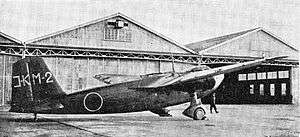Mitsubishi K7M
| Mitsubishi K7M | |
|---|---|
 | |
| Role | Experimental crew trainer |
| National origin | Japan |
| Manufacturer | Mitsubishi |
| First flight | 1938 |
| Primary user | Imperial Japanese Navy |
| Number built | 2 |
|
| |
The Mitsubishi K7M (or Mitsubishi Ka-18) was a 1930s Japanese experimental crew trainer built by Mitsubishi for the Imperial Japanese Navy to replace the K3M.[1]
Design and development
The K7M was a cantilever high-wing monoplane with a cabin for five students and two instructors,[1] and was of metal construction, with fabric-covered outer wings.[2] The K7M was powered by two 340 hp (254 kW) Gasuden Tempu radial piston engines.[1] The Navy decided the twin-engined type was too costly to replace the single-engined K3M and the type was not developed further, the two prototypes did enter service as trainers with the designation K7M1.[1]
Operators
Specifications
Data from [1]
General characteristics
- Crew: 2
- Capacity: 5 students, 2 instructors.
- Length: 13.23 m (43 ft 5 in) [2]
- Wingspan: 19.96 m (65 ft 6 in) [2]
- Height: 3.45 m (11 ft 4 in) [2]
- Empty weight: 2,558 kg (5,640 lb) [2]
- Gross weight: 3,810 kg (8,400 lb) [2]
- Powerplant: 2 × Gasuden Tempu radial piston engine, 250 kW (340 hp) each
Performance
- Maximum speed: 260 km/h (162 mph; 140 kn)
- Range: 950 km; 513 nmi (590 mi) [2]
Armament
- Guns: 2 × 7.7mm (0.303in) machine-gun
- Bombs: up to 90kg (198lb)
See also
- Related lists
References
| Wikimedia Commons has media related to Mitsubishi K3M. |
Notes
Bibliography
- Richards, M.C. (1970). "Your Questions Answered...:Mitsubishi Trainers". Air Pictorial (January 1970): 0. 29.
- The Illustrated Encyclopedia of Aircraft (Part Work 1982-1985). Orbis Publishing.
This article is issued from Wikipedia - version of the 6/23/2015. The text is available under the Creative Commons Attribution/Share Alike but additional terms may apply for the media files.